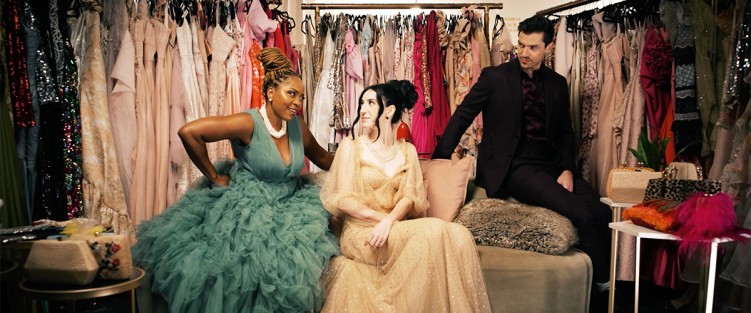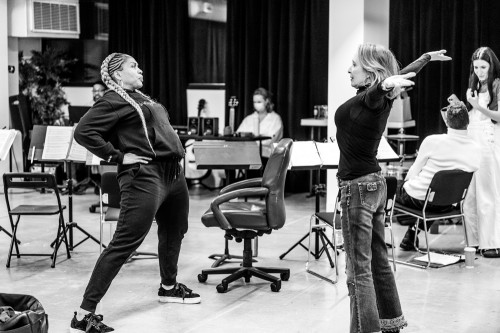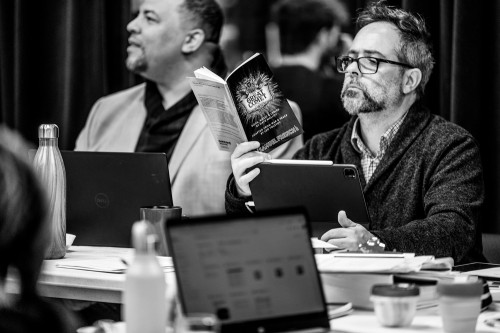 I walk into the Crow’s Theatre gallery space, on a mid-November day, excited to be here to sit in on the afternoon’s rehearsal of Natasha, Pierre & the Great Comet of 1812. The space is familiar to me from stage managing Uncle Vanya and The Master Plan here, but I have never seen it so full of stuff. There are instruments everywhere – a double bass, two cellos, a drum set, two keyboards, two accordions, a clarinet, someone with a guitar...
I walk into the Crow’s Theatre gallery space, on a mid-November day, excited to be here to sit in on the afternoon’s rehearsal of Natasha, Pierre & the Great Comet of 1812. The space is familiar to me from stage managing Uncle Vanya and The Master Plan here, but I have never seen it so full of stuff. There are instruments everywhere – a double bass, two cellos, a drum set, two keyboards, two accordions, a clarinet, someone with a guitar...
I say hello to actors I know, get a big hug from one, check in with the stage management team, and find where I am to sit to watch. For months I have been hearing the buzz at Crow’s about this hugely ambitious and exciting Canadian premiere, and their first full collaboration with the Musical Stage Company.
Creator Dave Malloy’s brilliant musical adaptation of Tolstoy’s famous novel War and Peace began as an off-Broadway experiment in 2012 and grew into a hit production on Broadway, garnering 12 Tony Award nominations in 2017 (winning two along with many other awards). The score is eclectic, encompassing indie rock, pop, folk, electronic dance and classic Broadway, and is completely sung- through, with many of the performers (soloists as well as ensemble) playing instruments as part of the immersive staging.
The story is taken from a 70-page slice of Tolstoy’s masterpiece: the young Countess Natasha Rostova has become engaged to the handsome Prince Andrei Bolkonsky, but Andrei’s father has insisted that they wait a year before marrying. As the opening ‘Prologue’ tells us, “There’s a war going on out there, and Andrei is not here.” The unexpectedly vulnerable Natasha finds herself swept up into a new infatuation, alongside dear friend of the family, Pierre Bezukhov, in part disillusioned by his unhappy marriage, who is questioning the meaning of his life.
Chris Abraham
In the middle of the crowded rehearsal space is a black wooden platform: it turns out to be a working revolve that will move into the theatre soon, as the set is being built. Luckily for me I get to see a preview of it in action. Director Chris Abraham walks in with a quick smile and waves “hello” and work begins. Oh my, this is going to be fun! It’s the “Abduction” scene – one of the big set pieces of the show where the rake Anatole Kuragin says farewell to his “gypsy lovers” and then with his friend Dolokhov (and the company) acts out how his planned elopement with Natasha will go. Part way through – the playacting turns into the real thing, a sweeping, fabulously inventive sequence that fills the space – with the revolve magically becoming a troika in which Anatole will drive Natasha away, only ... I won’t give away any more of the plot.
As they move for sequences already rehearsed into new staging, one of my questions coming into the rehearsal is answered: would Abraham be directing a musical in the same way that he does a play? The answer is mostly “yes”, While music is the fixed element leading the creation, the actors are all given freedom by Abraham to experiment with their moves, following their characters’ needs and emotions. He then gives notes at the end of a sequence to build on what they have given him, amplifying good ideas and opening up the staging so that it works for all three sides of the audience that will surround the playing space.
I watch, for example, the creation of a magical scene where the simple addition of a chaise and the spinning of the revolve echo the turmoil in Natasha’s heart. I comment later to Abraham how thrilling it was to see this degree of collaborative creation happening at this high professional level. “The lucky thing” he replies, “is that there is a great map in the show of what the characters want, what they are going after, and the problems that they have. Once you onboard everyone with all that – and musical theatre performers are very good at committing to those kind of things – they just jump right in.”
Abraham himself seems so remarkably at home and happy directing a musical (he has mentioned on social media that it has been decades since he last worked on one) that I ask about his past experience and discover to my surprise that this was how he started out! “When I was a teenager,” he told me, “I cut my teeth doing musicals with The Markham Youth Theatre which I founded, and then left that behind in my twenties when I went to university and the National Theatre School, but you know, that was the thing I loved first.”
That being said, I ask specifically “why this musical and why now?” and the answer is a fascinating one, going back to when he fell in love with Tolstoy’s novel in university. “There was something about Pierre’s journey – about him as the moral centre of the novel, and the delicacy of his revelation about what a good life means and how that is connected to other people – that was very significant to me when I read the novel the first time, ” he told me. “And then, when I saw one of the early pre-Broadway productions of NP&tGC I loved it. It did all the things I want theatre to do and I felt like it was made for me, like me personally, so I always had that in my back pocket. When the rights became available years later, I felt it was an experience that I wanted to share with other people. As I said to the team on the first day, it’s almost as though the goal of the show as a piece of theatre is to build the foundations for an audience to have a transformational experience that culminates with the revelation of what it is to wake up to a new life, so that they can both understand and feel the power of that experience that Pierre has in the story.”
Another thing that this musical does extraordinarily well, he continues, “is that it allows you to have an immediate understanding of and emotional access to a whole variety of characters from a variety of points of view. Included in that is a powerful immersion of the audience in the world of desire of this portion of the novel, and the sense that Dave Malloy creates of the characters being insulated in a world of champagne and caviar while the world burns around them.”
The great comet of the story, seen at first as a harbinger of destruction as it hangs in the sky above the decadent city of Moscow becomes at the end, in Abraham’s words, ”in a magical way a harbinger of life as opposed to destruction” as Pierre in his “leap of empathy to risk his comfort and his friendships in order to stand up for someone else” also gives Natasha hope for a new and better life to come.
In 2021, Crow’s and Musical Stage obtained the rights and were about to cast the show for a production at the Winter Garden Theatre when the pandemic shut it down. Now their dream is being realized in the magically immersive space of Crow’s own Guloien Theatre starting on December 5 with an outstanding cast of Canadian musical theatre stars.
Click here for more information about Natasha, Pierre & the Great Comet of 1812 . And for a taste of the show, there is a truly “Charming” music video featuring Hélène (Divine Brown), Natasha (Hailey Gillis), and Anatole (George Krissa).
Jennifer Parr is a Toronto-based director, dramaturge, fight director and acting coach, brought up from a young age on a rich mix of musicals, Shakespeare and new Canadian plays.





